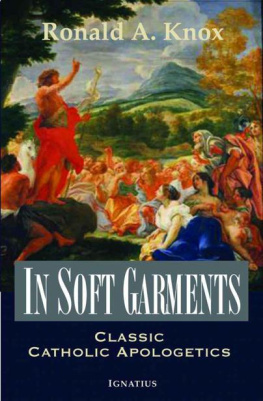Ronald A. Knox - St. Paul’s Gospel
Here you can read online Ronald A. Knox - St. Paul’s Gospel full text of the book (entire story) in english for free. Download pdf and epub, get meaning, cover and reviews about this ebook. year: 0, genre: Religion. Description of the work, (preface) as well as reviews are available. Best literature library LitArk.com created for fans of good reading and offers a wide selection of genres:
Romance novel
Science fiction
Adventure
Detective
Science
History
Home and family
Prose
Art
Politics
Computer
Non-fiction
Religion
Business
Children
Humor
Choose a favorite category and find really read worthwhile books. Enjoy immersion in the world of imagination, feel the emotions of the characters or learn something new for yourself, make an fascinating discovery.
- Book:St. Paul’s Gospel
- Author:
- Genre:
- Year:0
- Rating:3 / 5
- Favourites:Add to favourites
- Your mark:
- 60
- 1
- 2
- 3
- 4
- 5
St. Paul’s Gospel: summary, description and annotation
We offer to read an annotation, description, summary or preface (depends on what the author of the book "St. Paul’s Gospel" wrote himself). If you haven't found the necessary information about the book — write in the comments, we will try to find it.
St. Paul’s Gospel — read online for free the complete book (whole text) full work
Below is the text of the book, divided by pages. System saving the place of the last page read, allows you to conveniently read the book "St. Paul’s Gospel" online for free, without having to search again every time where you left off. Put a bookmark, and you can go to the page where you finished reading at any time.
Font size:
Interval:
Bookmark:

Knox, Ronald Arbuthnott, 1888-1957, author
This book was produced in EPUB format by the Internet Archive.
The book pages were scanned and converted to EPUB format automatically. This process relies on optical character recognition, and is somewhat susceptible to errors. The book may not offer the correct reading sequence, and there may be weird characters, non-words, and incorrect guesses at structure. Some page numbers and headers or footers may remain from the scanned page. The process which identifies images might have found stray marks on the page which are not actually images from the book. The hidden page numbering which may be available to your ereader corresponds to the numbered pages in the print edition, but is not an exact match; page numbers will increment at the same rate as the corresponding print edition, but we may have started numbering before the print book's visible page numbers. The Internet Archive is working to improve the scanning process and resulting books, but in the meantime, we hope that this book will be useful to you.
The Internet Archive was founded in 1996 to build an Internet library and to promote universal access to all knowledge. The Archive's purposes include offering permanent access for researchers, historians, scholars, people with disabilities, and the general public to historical collections that exist in digital format. The Internet Archive includes texts, audio, moving images, and software as well as archived web pages, and provides specialized services for information access for the blind and other persons with disabilities.
Created with abbyy2epub (v.1.7.6)





St. Pauls Gospel

RONALD KNOX
NEW YORK SHEED 8c WARD
Copyright, 1950, by Sheed & Ward, Inc.
NIHIL OBSTAT
Hugh F. Blunt, LL.D. Censor Deputatus
IMPRIMATUR IjilRichard J. Cushing Archbishop of Boston
Boston, November 8, 1950
MANUFACTURED IN THE UNITED STATES OF AMERICA
This series of Lenten Conferences was preached by Msgr. Ronald Knox in Westminster Cathedral on the Sunday evenings in Lent, 1950.
PAGE
The Pauline Approach. 1 -t
St Paul and the Old Testament.13
St Paul and Christs Divinity.25
St Paul and Christs Humanity.37
St Paul on the Mystical Body.49
St Paul on the Risen Life of the Christian . 61
Our brother Paul, with the wisdom God has granted him, has written you a letter (II Peter iii. 15)
WHEN YOU have been looking at a childs picturebook, it may have occurred to you to wonder, before now, how the printer ever managed to transfer those brightly-coloured illustrations from the block to the paper. The process, of course, is not a simple one; in reality, there are three processes, and the page you are looking at has been three times through the press, receiving successively its tints of red, yellow and blue. So it is, if you come to think of it, about the knowledge you and I have of the basic facts of our religion; three different layers of evidence have been superimposed, one on the next. First, there is tradition. The earliest Christians learnt their faith by word of mouth; you and I, if God had so ordered our destiny, might still, after all these centuries, be learning our faith by word of mouth. Next, there are the holy gospels; an account of our Lords life deliberately composed, for your information and mine, by men who had witnessed the events of it, or had lived so close to first-hand witnesses that the question of tradition hardly comes in. And finally, in the remaining books of the New Testament, you have a set of docu
ments, mostly in the form of letters, written during the life-time of men who had seen our Lord. They dont set out to give us a course of religious instruction, but they are all the better as evidence for that. We learn from such writers in the course of conversation (as it were) how Christian people lived and thought in that first age, an age lit up by the afterglow of our Lords own life on earth.
Leave out the four gospels, and most of the New Testament comes to us from the mind of one man, St Paul. I say from the mind not from the hand, because St Paul didnt usually write, he dictated. And you can trace his influence, no doubt, in the writings of other men who derived their inspiration from him. The Acts of the Apostles was written, not by St Paul, but by his friend St Luke; yet I think it is clear that St Paul must have encouraged him to write it, and supplied him with a good deal of his material. What shall we say of the Epistle to the Hebrews? The Church holds by the tradition that it was, in some sense, the work of St Paul, but the style of it differs noticeably from that of his acknowledged epistles. Must we suppose that, this time, he wrote with his own hand, wrote carefully, as a man writes when he is working out a thesis, instead of blurting out the thoughts of his pregnant mind, as he did to the stenographer? Or is it possible that he drew up a skeleton of the things he wanted said, and left some trusted disciple, Silvanus or another, to clothe it in his own words? Be that as it may, for our present purposes we will not use
either the Acts of the Apostles or the Epistle to the Hebrews except here and there, by way of illustration. We will build up our picture of St Pauls gospel from those vivid, personal letters of his, thrown off in the heat of the moment to the Christians in Rome, Corinth, Galatia, Ephesus, Philippi, Colossae, Thessalonica, and to one or two of his immediate friends.
I want to study St Pauls letters in isolation, forgetting for the moment that we have any Christian tradition, any Gospel narrative, to supplement them. So, I imagine, you might get the printer to give you a pull-off of that childish picture all in blue, with the yellows and the reds left out. I want you to see what an admirable blue-print you can get, even so, of the Christian world-picture, simply from listening to what St Paul has to tell us. It is rather like listening to one side of a telephone conversation; we can only guess, as we go along, what the people at the other end of the wire have been saying. Our pattern will be all built up out of bits and pieces, just fragments of talk overheard, sparks struck from the anvil of
forgotten controversies, and problems that have no
meaning for us now. But we shall see, already, the outlines of our Christian world-picture etched in for us, and with a firm hand, by a man who is not thinking about us or our difficulties; he is just talking to his friends.
It is an extraordinary thing, if you come to think of it, how the account of our Lord which you get in the Gospels dovetails in with the account of him you get in the epistles. Not in the sense that the two accounts agree;
that would be natural, that would be commonplace; rather in the sense that they disagree. I dont mean that they contradict one another; I mean that the things on which St Paul concentrates his attention are things upon which, apparently, the Evangelists do not concentrate attention, and vice versa. After all, ask anybody in the world who has heard of Jesus Christ to tell you what kind of Man he was. You will be told, at once, that Jesus Christ went about the world doing good, healing the sick, giving sight to the blind, and so on. There is no word of that in St Paul; with him, the whole of our Lords earthly biography passes unnoticed. Watch him, for example, when he is recommending to the Philippians the virtue of humility (Phil. ii. 5 sqq.). You would expect him to remind them how our Lord was born in a stable, his Mother a peasant; how he lived as a poor man, how he died as a common criminal. But it isnt, you find, our Lords behaviour as Man that he appeals to for his illustration; it is the condescension of our Lord in becoming Man at all. Always he misses the opportunity of telling us a story, the story of the greatest Man who ever lived.
Next pageFont size:
Interval:
Bookmark:
Similar books «St. Paul’s Gospel»
Look at similar books to St. Paul’s Gospel. We have selected literature similar in name and meaning in the hope of providing readers with more options to find new, interesting, not yet read works.
Discussion, reviews of the book St. Paul’s Gospel and just readers' own opinions. Leave your comments, write what you think about the work, its meaning or the main characters. Specify what exactly you liked and what you didn't like, and why you think so.













